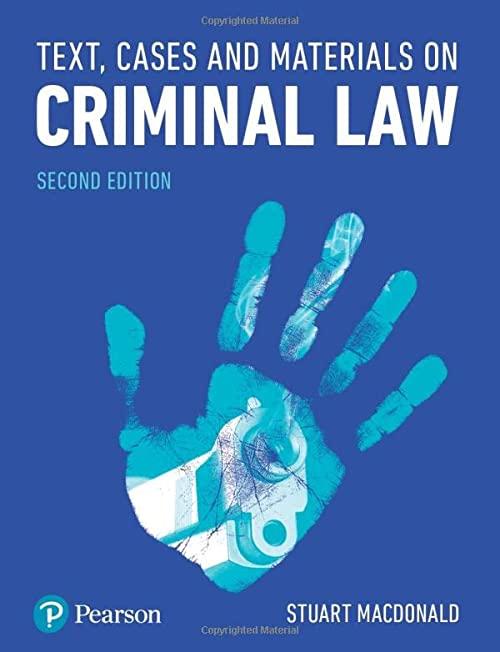Question
Part B: Project Zero Dawn (PZD) is a Norwegian company focusing on environmental activism and preservation of animal and plant species around the world. One
Part B:
Project Zero Dawn ("PZD") is a Norwegian company focusing on environmental activism and preservation of animal and plant species around the world. One of their largest projects was the construction of a gene bank, a global seed vault containing plant seeds and animal DNA samples. In case of plant extinction, or global apocalyptic events, the samples can be used to restore entire species to life. The gene bank is located well-within the Arctic Circle. In the late 2018, the board of directors of PZD approved two new initiatives. Firstly, PZD would go on to obtain samples of extraordinarily rare and exotic plants, previously thought too expensive to obtain. Secondly, PZD would obtain genetically engineered plants, capable of being stored for vast periods of time. The employees of PZD, therefore, travelled to a Global Plant Summit, an international trade fair where large numbers of plants are being regularly sold. They met with two companies there: United Plant Sellers ("UPS"), a French company, and Worldwide Gene Initiative ("WGS"), a company incorporated in the US. In their conversation with UPS, PZD mentioned that they are looking to procure rare carnivorous plants. UPS showed them a catalogue of such exotic plants, containing pictures and a Latin name of the plants in question. The PZD employee consulted with her boss and ticked off several boxes in the catalogue. They paid for the purchase with their card and signed no contract. The PZD employee-only said "please make sure to deliver them before September 2021", and the UPS employee nodded. Approaching the WGS stand, the PZD employees decided to purchase gene-modified seeds, the exact product that WGS specializes in. The process of gene editing is costly and time-consuming: the seeds need to be harvested by WGS, DNA sequenced, and subtle changes introduced via the use of the latest gene-editing tools. This is why the seeds offered by WGS are extraordinarily expensive. PZD placed an order for two tons of seeds edited to last 2000 years. In August 2021, PZD received their shipments from both UPS and WGS. When they opened the shipment from UPS, much to their surprise, instead of seeds, they found the actual carnivorous plants. Given that the plants were not able to withstand the extreme cold, they quickly perished. PZD was astounded, as for hundreds of years in the plant industry, it is customary to ship seeds, not actual plants. However, when they reached to UPS, their sales representative simply said "you could have harvested the seeds from the plants yourself after a few months, it is not our fault that the Arctic is cold". Given that they were busy dealing with their issues with UPS, PZD only opened the WGS shipment one month later, after they placed it in the room with all the other plant seeds they have stored. However, it turned out that the WGS seeds were infected with a very rare, airborne parasite, which damaged all the other plants in the room. This parasite only appears in wet areas, and the WGS production facility was indeed subject to an extreme, unexpected river flood six months ago. They checked a few of their shipments for damage, but not the one sent to PZD.
1. Assume that CISG applies to the contract between PZD and USP (no need to prove it). Did USP deliver the goods conforming with the contract?
2. Does CISG apply to the contract between PZD and WSG? Why?
3. Without prejudice to the previous question, assume that CISG does apply. Which costs, if any, would PZD be able to recover from WSG? Why?
Step by Step Solution
There are 3 Steps involved in it
Step: 1

Get Instant Access to Expert-Tailored Solutions
See step-by-step solutions with expert insights and AI powered tools for academic success
Step: 2

Step: 3

Ace Your Homework with AI
Get the answers you need in no time with our AI-driven, step-by-step assistance
Get Started


